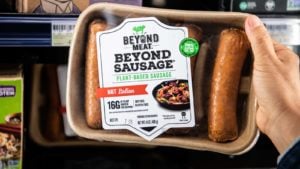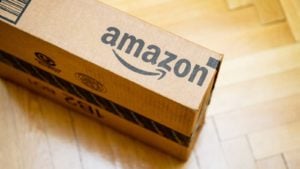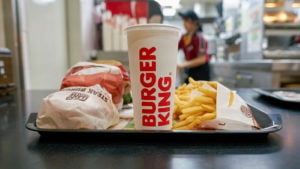
7 Stocks to Buy to Ride the Vegan Wave
Big and small, companies are jumping on the move to plant-based foods
[Editor’s note: “7 Stocks to Buy to Ride the Vegan Wave” was previously published in December 2019. It has since been updated to include the most relevant information available.]
The IPO success of Beyond Meat (NASDAQ:BYND) has me revisiting the world of plant-based foods and vegan stocks to explore how investors might take advantage of the move to meatless alternatives.
Today, the global plant-based meat market is worth an estimated $12.1 billion. That’s expected to grow to $27.9 billion by 2025, for a compound annual growth rate of 15%.
While many companies have focused on vegetarian and vegan markets in the past, it’s clear that most food companies are now going after the “flexitarian” consumer: people who still eat meat, but regularly opt for meatless alternatives.
Today, 29% of Americans identify themselves as “flexitarian,” with approximately 79% of Gen Z (those born between 1995 and 2015) eating plant-based food 1-2 times per week.
According to Nielsen, 98% of consumers who buy plant-based meat, also buy animal meat. The “vegan wave” is now the flexitarian wave.
Regardless of what you want to call it, these seven companies are taking advantage of the move to meatless alternatives, with serious potential to make a lot of money in the long run:
- Beyond Meat (NASDAQ:BYND)
- Tyson Foods (NYSE:TSN)
- Kellogg (NYSE:K)
- Amazon (NASDAQ:AMZN)
- ConAgra Brands (NYSE:CAG)
- Maple Leaf Foods (OTCMKTS:MLFNF)
- Impossible Foods
As a result of changes in consumer tastes, companies have invested a total of $16 billion in plant-based meat, egg and dairy products. Let’s look at how stockholders can make that money work for them.
Beyond Meat (BYND)

By now, Beyond Meat is a recognizable name for most investors, so I’ll keep the IPO details brief.
The plant-based food company went public on May 1, 2019, at $25 a share, selling 11.1 million units of its stock for net proceeds of $252 million, including the underwriters’ over-allotment. Three months later on August 2, insiders sold 3.3 million shares at $160 per share. The company sold 250,000 shares to the public, raising $36.8 million in net proceeds.
The company wisely waived the 180-day lock-up period for its main investors so that they could cash out a portion of their shares while they were up almost six-fold.
Beyond Meat’s Q1 2020 net revenues increased 141% year-over-year to $97.1 million, while its gross profit improved to $37.7 million (38.8% gross margin), for a net profit of $1.8 million, a 127% increase over the same period last year.
More importantly, on March 11, 2020, Beyond Meat rolled out its new Beyond Breakfast Sausage product. With 33% fewer calories than a leading brand of pork sausage patties, these are bound to be a hit with health-conscious consumers.
Tyson Foods (TSN)

Tyson Foods (NYSE:TSN) originally invested in Beyond Meat in 2016, buying 5% of the plant-based meat company. It upped its stake at the end of 2017 as part of a $55 million investment round.
Unfortunately for Tyson shareholders, the company didn’t make it to the ball, selling its shares in April 2019 for an undisclosed amount after Tyson CEO Noel White decided the company would create its own plant-based protein line. Tyson’s brand is called Raised & Rooted.
It competes with Beyond Meat. However, while its chicken nugget product is meatless, its burger contains Angus beef as well as pea protein isolate.
According to TSN’s chief marketing officer, “While most Americans still choose meat as their primary source of protein, interest in plant and blended proteins is growing significantly”.
By November of last year, Raised & Rooted products had made it into 7,000 stores across the U.S., almost double the number of stores carrying the brand in August.
Despite the increased rollout, Tyson didn’t make reference to Raised & Rooted in either its Q2 2020 10-Q or quarterly conference call with analysts.
Given the current problems with the country’s meat-based supply chain, Tyson really needs to step up its game in 2020 and beyond if it wants to be a player in plant-based foods.
Kellogg (K)

When most people think of Kellogg (NYSE:K), the first thing that comes to mind is likely cereal: Special K, Frosted Flakes, Mini-Wheats, etc. However, it has owned a vegetarian food brand called MorningStar Farms since acquiring the business in 1999.
The company sells over 90 million pounds of faux meat a year, with about one-third of that volume in fake burgers and the remaining two-thirds from other products such as chicken and sausage alternatives. Estimates suggest that MorningStar generates $450 million in annual revenue, about 1.3 times the $355 million Beyond Meat has sold over the trailing 12 months.
Beyond Meat is valued at 24 times sales. If MorningStar Farms were given the same valuation, it would be worth $13 billion to Kellogg, about 62% of the company’s current market cap.
And it’s clear that Kellogg is aware of MorningStar Farm’s potential. The big question is whether management is smart enough to take advantage of the popularity of meatless products.
On April 30, Kellogg announced on its quarterly conference call that it had delayed the launch of its “Incogmeato” burgers from the end of the first quarter to sometime in the second half of the year due to the novel coronavirus. The burgers will now be launched at the same time as its new plant-based sausage products.
Amazon (AMZN)

It has been a whirlwind few years since Amazon (NASDAQ:AMZN) stunned the world by acquiring Whole Foods for $13.7 billion.
Prognosticators of all types came out of the woodwork to predict the many changes Jeff Bezos might implement at the healthy foods grocery-store chain.
During the pandemic, grocery stores such as Whole Foods have been forced to limit the quantity of meat individual customers can purchase due to a breakdown in the supply chain. Plant-based foods are far less vulnerable to this kind of situation.
Whole Foods continues to up its plant-based offerings. In April, the grocery retailer launched Upton’s Naturals, a 100% vegan banana blossom product sourced from Sri Lanka, that mimics the flaky texture of fish, providing seafood enthusiasts with a plant-based alternative.
In the quarter ended March 31, Amazon’s sales at physical stores, meaning primarily Whole Foods, totaled $4.64 billion, 8% higher than a year earlier and 6.3% higher than the preceding quarter.
Furthermore, online grocery shopping has expanded by 60%, while the number of Whole Foods locations offering pickup-orders has nearly doubled to 150 stores across the country.
As it continues to push healthy, plant-based alternatives, Amazon will further grow its grocery business.
Con Agra (CAG)

This may be a little convoluted, but stick with me. In a previous article about the move to plant-based foods, I discussed Hain Celestial (NASDAQ:HAIN), one of the earliest adopters of meatless and vegan alternatives. One of its subsidiaries is Yves Veggie Cuisine, founded by Canadian food entrepreneur Yves Potvin in 1985. Potvin sold Yves to Hain in 2001.
Potvin’s next move was to create Gardein in 2003, a maker of meatless alternatives, including veggie burgers and chicken sliders. Potvin sold Gardein in 2014 to Pinnacle Foods, which is now a subsidiary of ConAgra Brands (NYSE:CAG), for $154 million.
ConAgra likely acquired Pinnacle Foods in part to take advantage of the flexitarian movement.
”That means the opportunity here could be in the range of $30 billion just in the U.S.,” CEO Sean Connolly said in August 2019. “And you know, there’s even more opportunity internationally.”
As grocery stores struggle to keep meat on their shelves during the novel coronavirus outbreak, meatless products have become a popular alternative. According to Nielsen, the sale of meatless products in the last week of March increased by 255% over the same week a year earlier. By comparison, meat sales grew just 53% year over year for the same week.
How has Gardein fared during the pandemic? ConAgra says sales increased by 65% year over year in the six weeks between March 13 and April 19.
If you are a CAG shareholder, Gardein is a major reason to hang on to your stock.
Maple Leaf Foods (MLFNF)

Restaurant Brands International (NYSE:QSR) used to be on this list. However, earlier this year it got rid of Beyond Meat products at all of its Tim Hortons locations in Canada.
Thankfully, as a Canadian, I’ve been able to replace it with Toronto-based Maple Leaf Foods (OTCMKTS:MLFNF), whose Protein Group, including plant-based food brands such as Lightlife and Field Roast, certainly fills the bill.
In early May, Maple Leaf reported its first-quarter results. Sales for the company’s Plant Protein Group grew 25.9%, double the sales of its Meat Protein Group. However Maple Leaf lost money in the quarter due to increased strategic investments for its plant-based business and lower market prices for livestock.
Yet the head of the company’s plant-based business believes Covid-19 has provided it with an opportunity to shine a light on its products.
“I think this is a pivotal moment for plant-based foods,” CEO Dan Curtin told FoodNavigator-USA. “We see significant upside in this category. Household penetration is still in the single digits although it’s increasing all the time, and we’re incredibly well positioned to grow with our two platforms.”
I like the taste of Beyond Meat’s products better, but that’s a subjective matter.
Impossible Foods

The aforementioned Restaurant Brands International owns Burger King. Last year, Burger King announced it was testing the Impossible Whopper, a plant-based version of its top-selling burger, for one month across all 7,200 stores in the U.S.
Today, that plant-based option is still available, although the company’s largest franchisee, Carrols Restaurant Group (NASDAQ:TAST), recently said the number of Impossible Whoppers it serves on a daily basis at a single location had dropped from 32 to 28. In comparison, it sells approximately 234 regular beef Whoppers daily.
Impossible Foods make the Impossible Whopper, the same people behind the plant-based burger that’s available at all Wahlburger locations across the U.S.
However, because the burger contains soy leghemoglobin, it isn’t considered to be vegan. But that might actually be a good thing; that same ingredient is the crux of the burger’s appeal to flexitarians, who are used to the strong flavor of meat.
In March, Impossible Foods raised an additional $500 million to fight the coronavirus threat and continue R&D. The company has raised more than $1.2 billion since its inception in 2011. Although the company was expected to go public at some point in 2020, it’s in no rush to IPO.
Impossible Foods CFO David Lee recently said that its Impossible Burger will be available at 1,700 Kroger (NYSE:KR) stores across the country while also adding availability at 777 other grocery store locations including Albertsons and Vons.
“We have not seen any interruption in our supply chain. While 95% of our consumers are meat eaters, the way we make our product is incredibly different. … We have a vastly different way to make our product that is far more efficient for us and far better for the planet,” Lee told Marketwatch in early May.
When it does go public, expect the valuation to be through the roof.
At the time of this writing, Will Ashworth did not hold a position in any of the aforementioned securities.